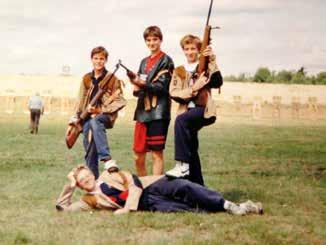
13 minute read
BEYOND THE SCHOOL GATES
GEOFF CLAYTON (1938-43)
The Nineteenth of November 1956. St Mary’s Church, Wollaton Park, Nottingham. The marriage of Geoff Clayton with Shirley Ward. Geoff had just completed two house jobs at the Middlesex Hospital and Shirley had been a Staff Nurse there. They had first spotted each other over the ward steriliser when they were students at The Middlesex, and introduced later by David Findlay. Yes, you have guessed it a fellow student.
Advertisement
Here we are in 2021 about to celebrate our 65th wedding anniversary. Helping us will be three children, five grandchildren, two greats and four in-laws. That is achievement enough. The rest is a humdrum account of the life and struggles of a young doctor and his nurse wife making their way.
Geoff and his twin brother Ian joined their elder brother Derek at WHS in 1938. It was an austere place when compared with descriptions in House magazine today. They were austere times. Thankfully times change but people don’t seem to. Eastbourne College followed as it was near home in Sussex, beside the sea and close to the South Downs. The School was evacuated to Radley when the Navy commandeered the place for a torpedo training school ‘HMS Marlborough’. We were far from the sea so the Thames had to do. Next National Service for two years based in Chichester, Catterick, Aldershot (RSM Brittain) and Lisburn with the Royal Signals. The demob suit had served me well since 1949 and has only recently been recycled!
After several years at The Middlesex Hospital as a student and junior doctor, Geoff and Shirley set up home in a small semi-detached house in Kew from where they set out on numerous jobs. Geoff as an SHO at St Anthony’s Hospital in Cheam and then a turn as a pathologist at Kingston Hospital. Later he did a number of locums in the neighbourhood where he acquired a taste for General Practice and landed up as a Trainee in Putney. Shirley had several private nursing jobs, a time in the teashop in Kew Gardens and a turn at the Tao Clinic “two doors past Harrods madam”. A year or so passed in this way and then William appeared at Queen Charlotte’s Hospital. Another year or so, and it was Richard’s turn at home in Kew. It was
The Clayton boys on their 90th birthday on 28 August 2019, from left Shirley, Derek, Ian and Geoff.
time to cast around for a proper GP job, but offers of partnerships in those days were like hens’ teeth. The best one could hope for was an “assistant with a view”; this meant underpaid dogs’ body while the senior partner enjoyed the golf course. The “view” rarely turned up. Dr Noel Sherrard in Beccles, however, took me on for a year and then retired to Eastbourne leaving the whole shebang to me. The authorities agreed.
We were on our own with two babies – soon to become three when Alice arrived, 1,500 patients, a telephone, a bedside speaking tube and an overdraft. It was tough – 24/7 and cradle to grave – but we managed and the practice grew, so soon we were able to take on help. Provincial town life with little cultural or professional activity began to pall, and we took ourselves off to Norwich where we had found another single-handed retiree. This time, however, we took our new partner, Sheila, with us and Mrs Kerridge from the Coop Pharmacy joined us as receptionist.
In Norwich the practice grew, the children grew. Shirley began The Clothes Horse with a couple of friends. We took on another partner, Keith. It was a very happy practice. There was time off. By the time we retired in 1989 there were four partners. The children had fledged. We lived in a lovely Queen Anne Rectory, the Clothes Horse flourished and we enjoyed a flat in Puerto Pollensa. We helped colleagues and enhanced our pension with locum work. And there was Takeheart. We had our own practice computer system in 1970, primitive but successful and useful. Takeheart grew from this. It was a method for predicting the chances of a heart attack and providing a five or six page written report in real time. It proved popular and a nice little earner both from home and elsewhere.
There was Marcus the donkey and Harry the Schnauzer. We joined a group of reenactors which proved to be a great move. Good company, rather mad, centred on a Home Guard platoon in the War. We took ourselves all over the place and had a high old time. In the sixties we had acquired a 1939 ex-Norfolk fire engine for use as a camper van. We refurbished it as a WVS mobile canteen, called her Mavis and enrolled her into the Civil Defenders as our lot called themselves. More fun. Happy times with our home, trips abroad, Murvi our new camper van, CDs, family and friends. But there came a time when we had to think about dismantling. Clearing out the Old Rectory, downsizing. Stressful times. We have ended up in a West Country cottage close to family who spoil us rotten and who have taken in Mavis as well. We have had our share of major health problems but are still around and still have each other, our marbles and a lovely extended family as we enter our tenth decade and recall the
Nineteenth of November 1956.”
CHARLES CRAWFURD (1956–1962)
I retain happy memories of my six years at WHS, though rather less fond ones of Radley where I went afterwards. I always felt there was something of ‘Tom Brown’s School days’ about the place! Having been a proud graduate of WHS’ ‘Mutton House College’ (the Remove) it is fair to say in my early days I did not achieve great things scholastically!
Having not gained A levels good enough to gain a place at university to read History, and really not having a clue what else I wanted to do next, I went to Technical College in Ealing (now part of Thames Valley University) to take a four year National Diploma in Hotel Management. It was there that I finally discovered what I wanted to do as a career – to work in the wine trade. I recall being fascinated by a talk and tasting on Champagne we were given by Patrick Forbes, a very upright former Guards Officer, but then MD of
Moët & Chandon. I knew instantly I wanted to know more about this fascinating (and enjoyable) product even though at that time I could most definitely not afford to buy the stuff!
On finishing college, I felt the need to do something else first, and so I applied to VSO and was accepted to go to Tanzania to a newly built YMCA hostel in Dar-es-Salaam. I was there to train local staff and recruit someone to take over from me. An interesting time, not least because relations were very strained between Britain and Tanzania over Rhodesia, which required great diplomacy in one’s behaviour.
It was while on VSO my first bit of luck was to meet my future wife, Penny, who was nursing in Kenya. We married in 1976 and are still happily married 44 years later.
After my return from VSO, I needed to get a job and so returned to my ambition to get into the wine trade for which neither then, or now, is there any standard route. It relies on perseverance and luck. I do remember being told I would never be rich but I would have a wonderful life and meet lots of lovely people. Looking back I can confirm that was definitely so, but the pay was OK too!
As with many jobs like this you go in at the bottom and hope to progress by endeavour and luck and the latter certainly came my way. Having joined a company in Park Royal, Charles Kinloch (later Saccone and Speed), I embarked on formal wine training courses with the recently established Wine and Spirit Education Trust (WSET) and progressed through the different levels, culminating in winning the Wine Trade Cup for top student of the year in 1975. Scholastically, I was definitely a late developer!
Prior to that, perhaps, my next significant bit of luck was to win the Vintners Scholarship, an award given annually by the City Livery Company, to enable a young person to travel in Europe visiting as many wine regions as they could manage with the money (the princely sum of £700). With the generous support of my employer, I was able to make that money last over 3 months. The trip began memorably with Moet & Chandon luxuriating in a bath at Château de Saran with a glass of Champagne in my hand and surrounded by Dior toiletries! Sadly, not every experience was of a similar level, but I managed to eke the money out for so long by using a tent where I was not getting free or very inexpensive accommodation. I recall the strange looks I got on campsites from fellow campers in shorts and flip-flops when I emerged from my tent in suit and tie. During that trip I visited many classic areas of France, Germany, Spain and Portugal.
On my return to the UK, I moved into the Buying Department under the tutelage of Sir Guy Fison and Hugh Cochrane, both masters of wine, and that was another stroke of luck because with their guidance I too became an MW in 1977.
Thereafter, my career remained firmly on the purchasing side, sourcing wines from all over the world. In the early days this was little beyond Europe, but I was lucky enough to be involved when countries such as Chile, Argentina, Australia, New Zealand and, after 1994, South Africa were first starting to emerge on the
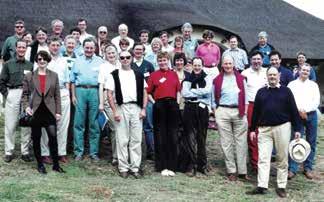
Charles on a Master of Wine trip to South Africa in 1995 at Bouchard Finlayson, Hermanus, with the aim of re-launching South African wines to the UK market which they did.
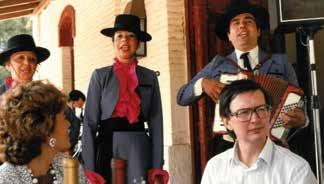
At a Chilean winery Errazuriz in 1988 on a Master of Wine trip with the aim of exploring the potential of the country to produce wine for the UK market which they imported before anyone.
Standing next to a giant cactus in Cafayate, Argentina, near vineyards that are the highest in the world at over 1700m and producing some of the best wines in the country.
world stage. Over the years I have visited all of these wonderful countries, saw some amazing sights, met loads of lovely people and tasted a lot of delicious (and some not so) wine. Before you ask, 1814 Vintage Port is the oldest!
During my working life I moved frequently, especially in the early years. London was followed by Liverpool, Newcastle-upon-Tyne, Dorking, Guildford and finally Bristol. I am lucky to have such a tolerant wife!
I retired in 2009 and decided it was time to put right that niggle of having put my two children through university by embarking on a History degree with the Open University. I completed that in 2013 and gained a First, of which I am very proud, and put me on a par with them!
Since then I have become a volunteer guide at Wells Cathedral. It has been a joy to work at the cathedral, share with visitors its beauty and history and make many new like-minded friends. We are lucky to live in such a beautiful part of the world in Somerset, something we came to especially appreciate during ‘lockdown’. We have our health and a lovely and growing family. Yes I have been lucky!
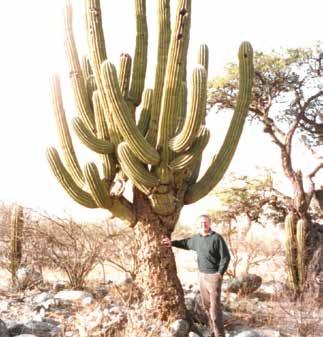
JULIAN BERKELEY, HEAD OF SCIENCE AT WHS FROM 1981–1985
After four years as Head of Science at WHS, Julian took up the post of Head of Science at Woodcote House School in Surrey. It was a small, family-run, school when he arrived with his wife Jan and their 18 month old son Daniel. They spent 24 very happy years at the school, over-seeing the development of a new science centre (a considerable improvement on the shed Julian started out with), the new shooting range and a myriad of other changes. Julian and Jan became house-parents in the outlying dormitory (a lovely house in its own grounds) which they ran for 14 years. Their family grew in time, with Daniel followed by Sam and James. Woodcote was and remains a very happy place, with a close bond between school and parents, which encouraged Julian and Jan to remain there for
so long. On Sundays, Julian would run wide games, which the boys loved, and they would make camp fires to cook chips on. In the summer, the boys would build dens called "huts" in the woods.
When the Berkeleys left in 2009, by which time Daniel was a married junior doctor in Carlisle, Sam was studying for a career in journalism and James had left home to study music in Brighton, they moved to Jan's beloved Lake District where they live now. Jan does online and 1-to-1 teaching. Julian ran a Christians Against Poverty debt-counselling service for his church for five years and, having handed that on, is now creating content for online educators EdPlace. Whilst the focus of Julian and Jan’s attention is on their four grandchildren aged 18 months to 10 years, as well as the beautiful Lakeland fells amongst which they live, Julian’s interests are eclectic. Music has gained a higher place in Julian’s life in the past year and he is a keen fan of many progressive rock bands, attends concerts and gigs all over the country and spends a lot of time listening to and collecting music. He is involved with the local conservation volunteers ‘Wild Ennerdale’, sings in the Whitehaven Male Voice Choir, is passionate about wildlife, the natural world and climate change and loves constructing and painting models.
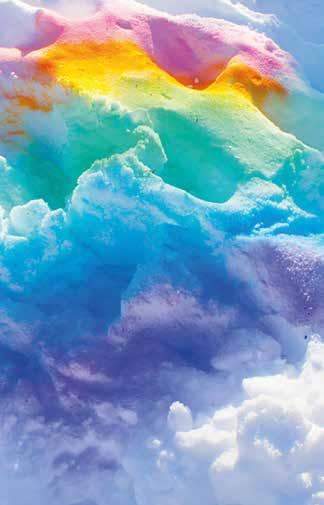
THE ABOMINABLE SNOWMASTERS
As a scout in the Christ's Hospital troop, Julian would play wide games whilst on camp in Wales and 'wide' would be the order of the day as it would take up much of the valley they were camping in. There are two teams with one trying to get a flag, for example, planted in the opposition's area. At WHS, Julian’s favourite took place one snowy afternoon in February. Tim Anderson was in charge of the scouts but got the entire school involved in a wide game he called "The Abominable Snowmasters". Each member of staff was given a woolly hat and three 2 litre bottles of coloured water and told to disappear off into the grounds and beyond. Each member of staff had a different coloured water in their bottles, the school were divided into teams and had a particular Snowmaster to follow according to the colour of the trail. In typical schoolboy fashion, the Abominable Snowmasters were all ‘incontinent’ and had to stop at regular intervals to 'relieve' themselves with their coloured water. Once discovered the Snowmaster would be "scalped" (divested of their woolly hat)! Everyone loved this game, staff and pupils alike, as it took in all the grounds and some of the surrounding Brackley countryside. H
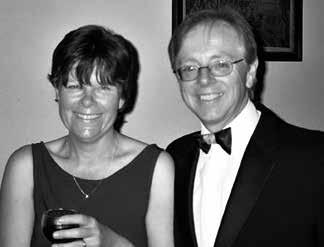
Above: Julian with his wife Jan at their leaving party in 2009.
Below: Julian underneath his three sons (left to right) James, Daniel and Sam.
